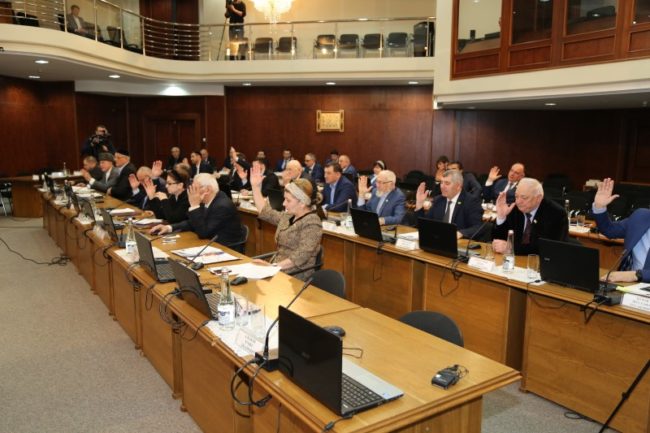

 The Prosecutor’s Office of Ingushetia has recommended that parliament withdraw a law prohibiting the glorification of Joseph Stalin. Ingush Deputy Prosecutor Girikhan Khazbiev claims that the draft law contains a ‘corrupt component’.
The Prosecutor’s Office of Ingushetia has recommended that parliament withdraw a law prohibiting the glorification of Joseph Stalin. Ingush Deputy Prosecutor Girikhan Khazbiev claims that the draft law contains a ‘corrupt component’.
In his letter to parliamentarians, Khazbiev writes that he believes the bill contains ‘the use of unsettled, ambiguous terms and opinions’. In addition, the Prosecutor’s Office says that the ban violates citizens’ constitutional right to freedom of speech and thought.
The bill, adopted on 27 February 2017, prohibits not only the installation of monuments, busts and the naming of villages, streets, and institutions after Stalin, but also public justification or approval of his activities, including by placing his image in public places and administrative premises with the goal of exalting his personality or deeds.
The Ingush Parliament has signalled that it will not comply with the Prosecutor’s Office’s request. Zelimkhan Yevloyev, speaker of the parliament, expressed defiance in an interview with Russian newspaper Kommersant.
‘Someone out there may have another opinion of the crimes of Stalin, let them think so, but we will go till the end, we will consider and adopt the law in any case’, he said, noting that MPs are also ready to defend the law in court.
Stalin’s deportations
The ban was passed unanimously on its first reading in parliament on 22 February, on the eve of the 73rd anniversary of Stalin’s mass deportation of the Chechen and Ingush peoples. On that day, over 91,000 Ingush were forcibly removed to Central Asia. The entire nation was deported on false charges of ‘state treason’. Nearly half of the population died on the journey or while in exile from hunger, cold, and disease. The deportation has been recognised by many, including the European Parliament as genocide.
In recent years, a campaign to glorify Joseph Stalin has been launched by nationalist groups in Russia. Hundreds of monuments and busts have been erected throughout the country. This includes the North Caucasus, for example in Krasnodar Krai, Stavropol Krai, and Daghestan. The Russian authorities have encouraged the efforts of nationalist groups to rehabilitate Stalin.
[Read: After 73 years, the memory of Stalin’s deportation of Chechens and Ingush still haunts the survivors]









